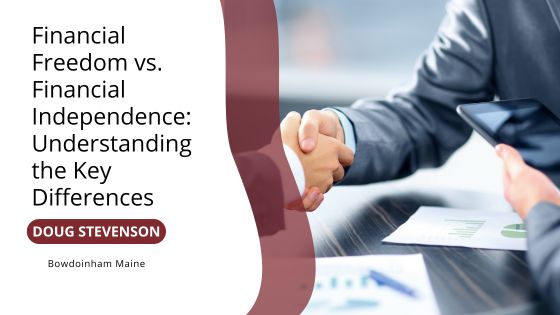Many people use the terms “financial freedom” and “financial independence” interchangeably, but they are not the same. While both concepts revolve around having control over your finances and reducing financial stress, they have distinct meanings and require different approaches to achieve. Understanding the differences can help you set clearer goals and create a financial strategy that aligns with your aspirations.
What is Financial Independence?
Financial independence refers to reaching a point where you no longer rely on active income from a job or business to cover your living expenses. This means having enough savings, investments, or passive income streams to sustain your lifestyle without needing to work.
Achieving financial independence typically involves:
- Saving and investing aggressively over time
- Living below your means to accumulate wealth
- Generating passive income through investments such as stocks, bonds, real estate, or dividends
- Reducing debt to minimize financial obligations
For many, financial independence is the ability to retire early or step away from a traditional 9-to-5 job while still maintaining a comfortable lifestyle.
What is Financial Freedom?
Financial freedom, on the other hand, is a broader and more subjective concept. It means having the financial resources to do what you love, without being constrained by money-related worries. Financial freedom is not just about covering basic expenses but also about achieving personal and lifestyle goals.
Some key aspects of financial freedom include:
- Having the flexibility to choose how, when, and where to work (or not work at all)
- The ability to pursue passions, hobbies, and experiences without financial constraints
- Eliminating stress and anxiety related to money
- Building wealth that allows for generational financial security
While financial independence is often a stepping stone to financial freedom, true financial freedom extends beyond simply meeting financial obligations—it’s about having enough wealth to enjoy life on your own terms.
Key Differences Between Financial Freedom and Financial Independence
- Goal Scope – Financial independence is about covering necessary expenses without relying on a paycheck, whereas financial freedom is about living life without financial limitations.
- Mindset – Financial independence often focuses on frugality and disciplined saving, while financial freedom emphasizes abundance and wealth creation.
- Timeframe – Achieving financial independence is typically a long-term goal, while financial freedom can be reached at different levels throughout life.
- Lifestyle Choices – Financial independence might mean maintaining a minimalistic lifestyle to ensure passive income covers expenses, while financial freedom allows for more discretionary spending and lifestyle upgrades.
- Risk Tolerance – Financial independence usually involves calculated risk-taking to reach stability, whereas financial freedom may involve bolder investments and entrepreneurial ventures.
How to Achieve Both
- Build Multiple Income Streams – Diversifying your income sources through investments, side businesses, or passive income streams accelerates progress toward both financial independence and financial freedom.
- Control Spending – Practicing smart money management, budgeting, and avoiding unnecessary debt helps build wealth faster.
- Invest Wisely – A strong investment strategy, whether in stocks, real estate, or other assets, is key to achieving financial security.
- Define Your Goals – Understanding whether you seek financial independence, financial freedom, or both will shape your financial plan and decision-making.
Final Thoughts
Both financial independence and financial freedom are valuable financial milestones, but they serve different purposes. Financial independence allows you to step away from traditional work, while financial freedom provides the ability to live life without financial constraints. By understanding these differences, you can craft a financial plan that aligns with your personal and professional aspirations, ultimately leading to a life of security, abundance, and fulfillment.

